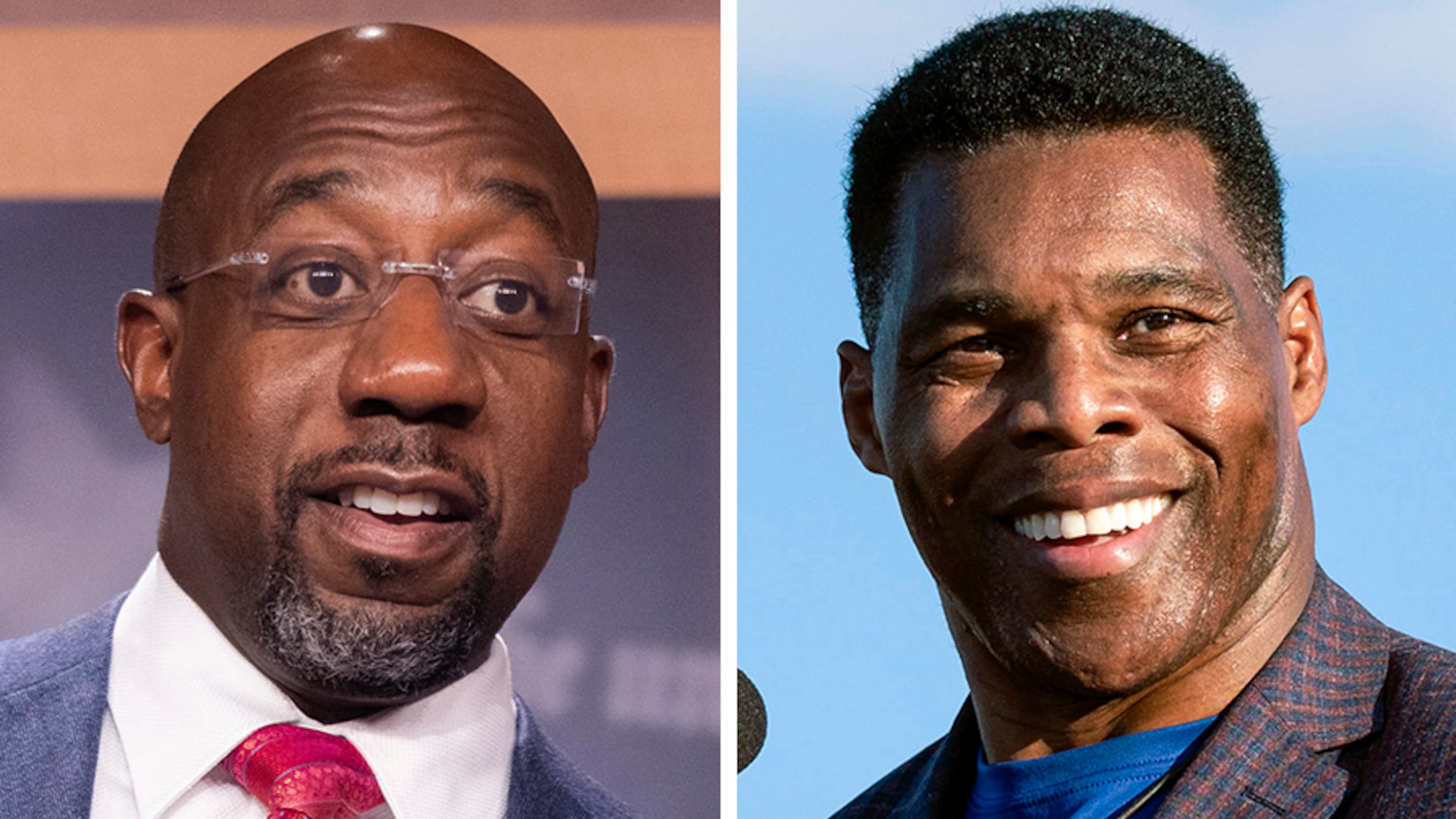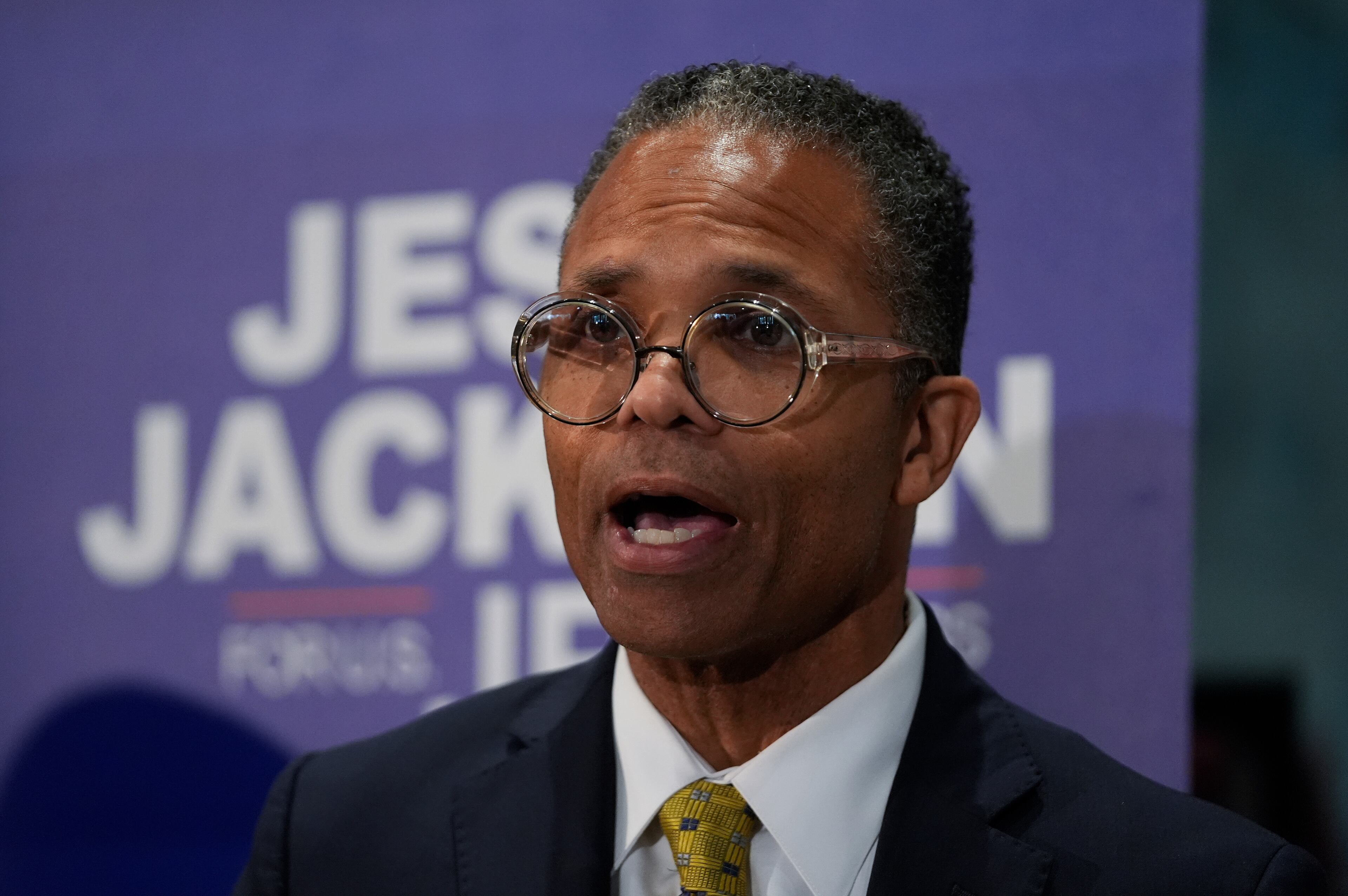Walker, Warnock: Candidates profess their faiths in different ways

Herschel Walker begins every campaign rally the same way.
“I want to start by acknowledging my Lord and Savior Jesus Christ,” he says. “Because if you don’t acknowledge him, he’s not going to acknowledge you.”
For Raphael Warnock, “a vote is a prayer about the kind of world we want to live in.”
“And our prayers are stronger when we pray together,” he continues.
In Georgia’s bruising race for the U.S. Senate, Walker and Warnock don’t agree on much. But there is one characteristic both men share — a deep Christian faith.
Both were raised in devout households. Warnock has risen through the ranks of the Black church to lead the most famous house of worship in the civil rights struggle. Walker a born-again Christian, credits God with lifting him out of a dark period in his life when he battled mental illness.
Still, they speak about religion differently, in ways that reflect both their own beliefs and the voters they are trying to reach.
Andra Gillespie, a political science professor at Emory University, said Warnock hails from the progressive, social justice tradition of the Black church while Walker speaks in the fiery cadence of a country preacher, apt to appeal more to evangelical voters.
“Herschel Walker is tapping into the community of faith and using coded language that says to white evangelical voters, ‘I’m one of you,’ ” Gillespie said.
Georgia 2022: U.S. Senate election
- Where the candidates for Georgia’s Senate seat stand on the issues
- Polls, money and predictions: Inside the U.S. Senate election
- Herschel Walker: In-depth candidate profile from the AJC
- Raphael Warnock: In-depth candidate profile from the AJC
- Track: Early and absentee voting in Georgia
- Georgia voter guide: Info about candidates, issues and elections
‘Warrior for God’
About 100 people were waiting when Walker’s campaign bus eased into Waycross on a brilliant Friday afternoon in late October. Ralph Reed, the head of the Faith and Freedom Coalition, clambered onto the small stage and introduced Walker as someone who “won’t be controlled by anybody but the Lord.”
Dressed casually in a T-shirt, a smiling Walker then launched into what sometimes felt as much like a religious revival as a campaign rally.
“God has prepared me for a time like this right here. And I know I didn’t realize it right then, but I know it now,” Walker said, gaining energy as he leaned into the shouts of approval from the crowd. “I’m not a politician. I’m a warrior for God.”

Throughout his campaign — as it has careened from scandal to scandal involving domestic violence, abortions and previously unacknowledged children — he has made redemption a central theme.
“Because of the grace of God, I realized that we all fall short of the glory of God. So what you have to do, you have to get washed in the blood and get born again,” he said in Waycross.

Warnock has questioned that storyline, saying the Republican hasn’t owned up to past threats of violence against his ex-wife as well as other troubling accusations.
“It’s hard to be redeemed if you’re not willing to come clean about the basic facts of your life,” Warnock said in an Oct. 16 debate that Walker didn’t participate in. “This race isn’t about who’s redeemed. It’s about who’s ready.”
But conservative voters have responded, especially evangelical Christians who make up the GOP base. In a race that polls show is statistically tied, Walker needs those voters to win and, as the various allegations against him have mounted, some have responded by embracing him even tighter.
“I see a man who has reversed his life,” retired minister Barry Walker said at a campaign stop in Rome. “I see a man who has been redeemed by Jesus.”
Walker said that as long as he can remember Christianity has been a fundamental part of his life
In his memoir “Breaking Free,” he described growing up outside the tiny town of Wrightsville where Ranger’s Grove Church of God and Christ “was the sun around which our lives orbited come the Lord’s Day.”
His mother and grandmother sang in the choir, and churchgoing was an all-day affair.
One Sunday when he was 14, Walker, then a chubby kid who stuttered, hid his shoes so he wouldn’t have to go to church. His mother helped him search until she finally said he had to go to church, shoes or not.
“Jesus don’t care what you look like,” she said, as he recounted in his book. That remark stuck with him.
“I thought that was unusual because it seemed like everybody else cared what I looked like,” he wrote.
Three hours later he left the church “knowing that I was going to be on a new spiritual path.”
‘Intersection of faith and justice’
After preaching at Ebenezer Baptist Church one Sunday, Warnock offered an encore at dReam Center Church in DeKalb County, where he was greeted with rousing cheers from hundreds of worshippers.
“I was a preacher before I was a senator, and I’m still a preacher,” he said.
“Amen,” came the response from the crowd.
Warnock seemed completely at home as he extolled the virtues of early voting and compared casting a ballot to prayer. This was a “Souls to the Polls” rally, which allowed him to merge his political life with his day job as a religious leader.
“I live my life at the intersection of faith and justice — making and helping people to live their best possible lives,” he told reporters afterward. “And so my work in politics is fueled by my faith, by my commitment to the values in my faith like justice-making and truth-telling and standing on behalf of people who don’t have a voice.”
Warnock knew early on he wanted to be a preacher like his father. When he was a child, his mother listened as he practiced delivering a sermon in the bedroom of their Savannah home. He gave his first sermon at age 11 at Calvalry Temple, his family’s church.

A skinny kid who was the 11th of 12 children, he was raised in a conservative Pentecostal household but soon felt drawn to the Baptist faith, with its roots in social and racial justice. His inspiration was the Rev. Martin Luther King Jr.
“By the time I was seventeen, I spoke with the cadence of a seasoned Baptist preacher, standing in pulpits across Savannah, leaning slowly and authoritatively into each syllable, as if eternity itself were contained in every word. Channeling King’s voice, I began the journey toward finding my own,” he wrote in his memoir, “A Way Out of No Way.”
After graduating from Atlanta’s Morehouse College, Warnock attended Union Theological Seminary in New York. At Abyssinian Baptist Church in Harlem, he fell in with the Rev. Calvin Butts, the charismatic preacher who deftly blended his spiritual duties with political advocacy. Warnock calls Butts, who died just last week, a mentor.
The balance he saw Butts practice was one Warnock would emulate years later when, in 2005, he took the helm of Ebenezer, where King preached throughout his life.
On the campaign trail, Warnock talks of his faith with a lighter touch than Walker.
“Forgive me, you hired a preacher to be your senator,” he quipped at a recent event in Atlanta after he said he was done speaking but then, as he often does, kept talking.
Warnock walks a more careful line than Walker when it comes to speaking about religion. He must embody the traditions of the church without alienating nonbelievers. Overall, religious participation is on the decline in the United States. Among Democrats, that drop has been steeper, especially among younger voters.
“I love that he is unafraid to talk about his faith,” Mary Little said after hearing Warnock speak in Macon. “Even if you don’t believe in yourself, he doesn’t make you feel threatened or uncomfortable. You just feel love.”
But Warnock has taken heat for his support of abortion rights, a stance some Christians find contradictory.
“Pro-choice pastor?” Walker said at a stop in South Georgia. ”What is that?”
But Warnock has said that the issue of “life” is about more than just abortion.
“I am a man of faith. I am a pastor. I have a profound reverence for life. And I have a deep and abiding respect for choice,” Warnock said at a rally in Macon.
“But if you are concerned about life as I am, it seems to me that you would be morally offended by the fact that a decade after we pass the Affordable Care Act, Georgia state officials are still refusing to expand Medicaid,” he said. “If you really do care about life the way I care about life, then you ought to be offended by the fact that we have the highest maternal mortality rate in the country.”
“Amen,” said someone in the crowd.
Staff writer Tia Mitchell contributed to this article.



